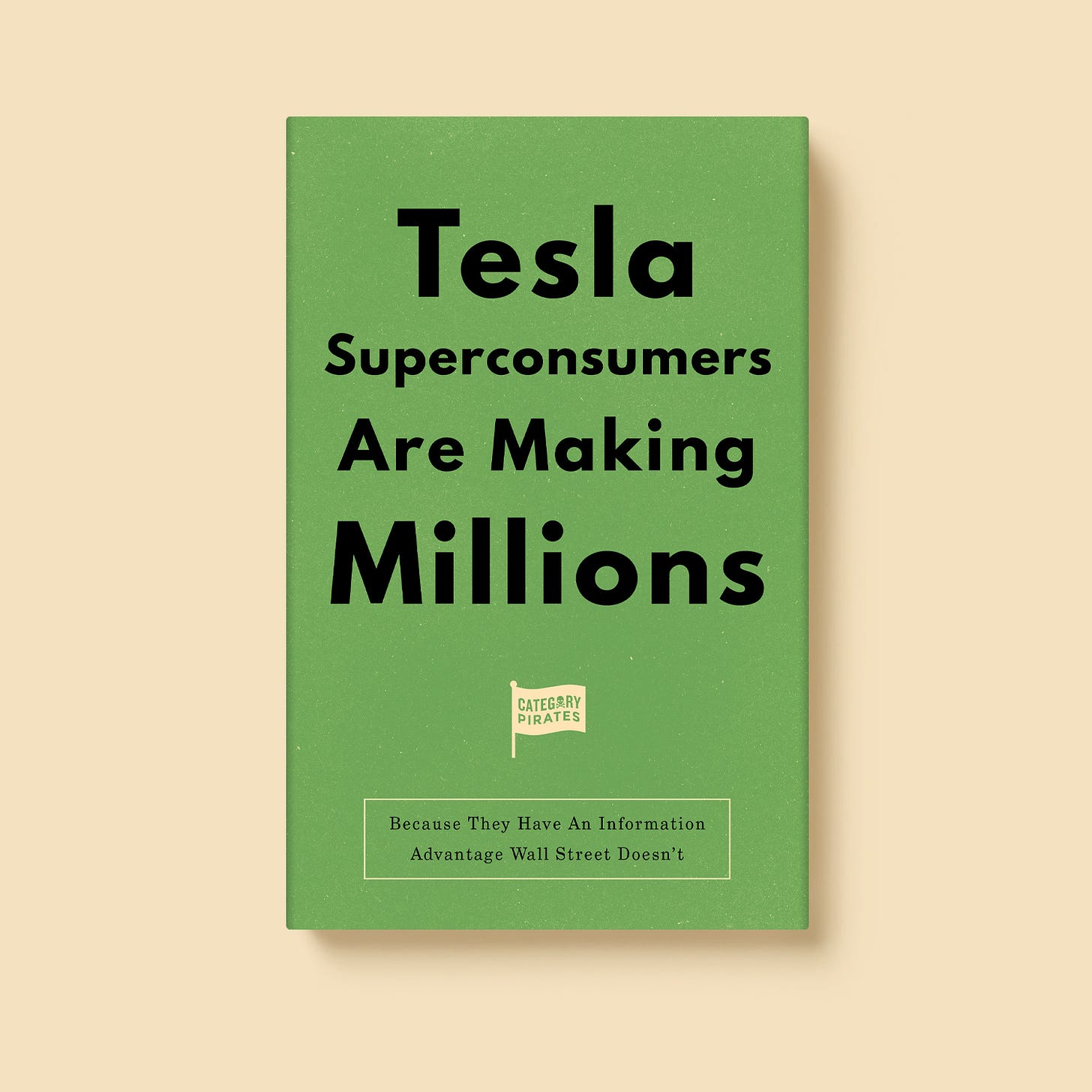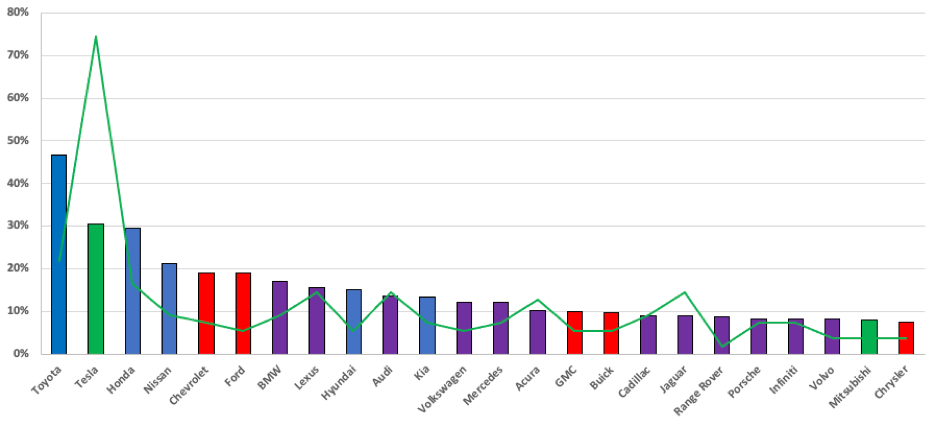Tesla Superconsumers Are Making Millions—Because They Have An Information Advantage Wall Street Doesn’t
They don't call them "Teslanaires" for nothing.
Arrrrr! 🏴☠️ Welcome to the free edition of Category Pirates. Every Wednesday, we publish radically different ideas with the goal of helping you create, design, and dominate your own category—in business and in life. If you enjoy this letter, we encourage you to check out some of our other favorites:
To hop aboard the pirate ship, subscribe below 👇
Dear Friend, Subscriber, and fellow Category Pirate,
Tesla shorts lost $38 billion dollars in 2020—many of whom are quite famous and experienced investors like Jim Chanos who famously shorted Enron before it collapsed.
Credible business publications like the Wall Street Journal and CNBC have had opinion writers like Charley Grant repeatedly predict the doom and gloom of Tesla, despite the fact that TSLA stock rose 7x in 2020. For example, Charley Grant went on CNBC on July 25, 2019 and said the days of Tesla as a growth darling are numbered.
This was shortly after one of us Pirates (Eddie Yoon) went on CNBC on June 11, 2019 and said that Tesla would bounce back like Netflix did in 2011.
Many retail investors who were bullish early on Tesla have reaped the benefits of the $38 billion dollar short loss. So much so, that near the end of 2020, Bloomberg called these successful Main Streeters “Teslanaires.”
In a time where income inequality has never been higher, Tesla’s mid 2019 to 2020 stock performance may represent the single greatest transfer of wealth from Wall Street to Main Street.
Which begs two questions:
How was it that “Wall Street experts” were so wrong about Tesla?
And how is it that so many “Main Street” investors were so right?
The truth is, it’s very difficult for Wall Street to value Category Creators, who by definition blur the lines of current categories while pursuing strategies and business models that are so radically different it can confound “experts” in legacy categories. When there are no comparison companies, no pattern recognition, Wall Street analysts do not know how to “model” the business—and as a result, assume it is overvalued.
It is also the case that much of Wall Street is risk averse, pursuing legacy M&A strategies of consolidation and stripping out ‘synergies’ (e.g., cost cutting) opposed to M&A that accelerates new categories. The former is easier to calculate. The latter, through their eyes, edges on speculation.
But there is a massive canyon between M&A for Category Consolidation and M&A for Category Acceleration.
This difference is lost on many. And this is not just true of Wall Street, but industry experts in consulting, banking and academia as well.
The rise of the Main Street investor is in part the rise of the “superconsumer investor”—investors that focus on investing in companies they know well, love dearly, and intimately understand because they are superconsumers of that category and company.
*Note: superconsumer investing is not a new idea, as Peter Lynch has long advocated for investing in companies you already buy and like.
But as superconsumers today are more able to connect in digital communities, they share information and learn at exponentially greater rates thanks to social media platforms like Twitter and YouTube—or, most recently, the r/wallstreetbets subreddit.
For example, take a look at James Stephenson, who puts out a prodigious amount of financial research, analysis and forecasts on Tesla for free on Twitter. His forecasts are famous for being incredibly accurate within plus or minus single digits, whereas most of Wall Street continues to be off by a huge amount. Or Galileo Russell, whose HyperChange youtube channel has 135,000 subscribers and has been put at the front of the line to ask questions on Tesla earnings conference calls by Elon Musk ahead of the Wall Street professionals.
These superconsumer investors are not investing experts. They are category experts.
And as a result, are becoming trusted sources in their respective categories—showing you don’t have to be an analyst at Goldman Sachs to be acknowledged as a thought leader in your niche.
The Tesla short example shows the single greatest opportunity for wealth creation for a Main Street investor is in a category creation situation where they are an expert. In these instances, Wall Street is likely to be the most confused and incorrect, and superconsumer investors are likely to have the greatest information advantage.
A national survey of 3,000 plus folks on investing conducted by fellow Pirate Eddie and his consultancy, EddieWouldGrow, highlights that 54 percent of investors prefer to invest in companies that make products and services they know well and love. Superconsumers are not just the top 10-20% of consumers that drive the lion share of category revenue and profits—they are also the most emotionally engaged and the most insightful consumers in the category. They can see around the corner and predict the future of the category, oftentimes ahead of the executives and entrepreneurs leading companies.
Elon Musk has even come out and said that Main Street investors ask far smarter, more insightful questions and understand Tesla better than most of the Wall Street professionals. And as companies like Robinhood and Public continue to make investing much easier for Main Street investors, more and more superconsumers are likely to invest in companies they have an information advantage on.
So, what do Main Street investors intuitively know about Tesla that Wall Street does not?
Here is a nationally representative study of car owners and Tesla owners in 2019.
The bars below represent the percent of Americans who would consider buying that brand of car.
Blue bars = Asian car brands
Red bars = American car brands
Purple bars = luxury or European car brands.
The green line represents the brand consideration of Tesla Model 3 owners.
A few things to note here:
In 2019, Tesla was already the second-highest brand in terms of national consideration right after Toyota (the largest car manufacturer in the world). But what is striking is the Tesla Model 3 consideration. Once you go Tesla, you don’t go back. Because just about every car brand is not a credible substitute for a Tesla. Tesla is a new and different category of car. Unlike every other car maker—who all play the “be the best” or the “be the winner” comparison game—Tesla is winning by playing the “We’re different” game.
What is also striking is that it’s the mainstream priced brands that lose the most consideration versus some of the luxury brands. This is the next most important finding, which is that Tesla has successfully gotten people who don’t normally buy luxury cars to “trade up.”
Tesla is both a mass-market and luxury brand at the same time.
Like all category designers, the company and product do not fit into old boxes. They are new. They are Different. They cannot be compared to what came before.
This ability to understand category creation because you are a superconsumer of the category and product can be an incredible information advantage. In the summer of 2011, Netflix announced a soon-to-be aborted strategy to separate DVDs from streaming (remember Qwikster?) and a 60 percent price increase. The stock tanked 80-90%.
Yet in Harvard Business Review, we wrote several times that Netflix’s price increase was actually good for consumers and that Netflix’s best days were to come, because the generational demand shift for streaming was undeniable. The CATEGORY was growing, and Netflix had the dominant position in that emerging category. This same approach allowed us to see in June of 2019, Electric Vehicles had huge demand tailwinds and Tesla was poised to reap the benefit of it.
Tesla in 2019 resembled Netflix in 2011.
If one had invested in Netflix and Tesla at the times of those articles, it would lead to a 90 percent CAGR or 11-12x the historical stock market average.
Our goal for this newsletter is not to give investment advice.
Let us say this again! We’re not investment advisors!
But we do want to show you the principles of how to apply category design thinking so that you can recognize the situations where your natural superconsumer powers far exceed those of the “experts.”
Furthermore, using this information to invest wisely—in both your financial portfolio and your career (e.g., which company you choose to work for), is perhaps our best contribution to society— as we seek to help build millions of Main Street millionaires.
(Kind of like these Tesla millionaires.)
Arrrrr,
Category Pirates
PS: We’re so glad you’ve been enjoying the launch of the Category Pirates newsletter. Up until this point, we have been publishing all our work for free (to give new readers a taste of the rum we have on our ship), and next week we will begin publishing the majority of our work to paying subscribers only. So if you haven’t hopped aboard and become a pirate yet, you’ll want to do so now. ARRRRRrrrrrrrrr!






Great write up. My wife bought a Tesla in 2019 along with some shares of stock. Her portfolio is looking pretty nice right now.
More importantly this speaks to the power of winning at your own game with your own category rather than competing in an established niche.